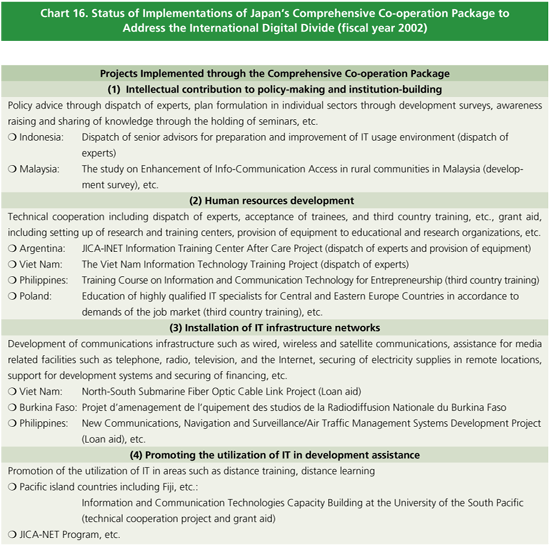

| Part III. | ODA DISBURSEMENTS IN FISCAL YEAR 2002 |
Japan’s perspective on debt relief, methods of disposal of
ODA loan debt, etc. has already been discussed in
Part II.
Japan’s disbursements for Grant Aid for Debt Relief in fiscal year 2002
amounted to approximately ¥30.3 billion for 16 countries.
In the “Okinawa Charter on Global Information Society (IT
Charter)” announced at the Kyushu-Okinawa Summit in July 2000, IT is described
as one of the most potent forces in shaping the 21st century. Because
IT is an outstanding consumer-led technology, people are aware of the opportunities
it affords and it is possible for the international community to achieve further
development through the active utilization of IT. For this reason, all people,
no matter where they are, should receive the benefits of the global information
society and the elimination of the digital divide is an extremely important
issue.
Japan announced “Japan’s Comprehensive Co-operation Package to Address
the International Digital Divide” at the Kyushu-Okinawa Summit in July
2000. This cooperation policy advances cooperation through non-ODA and ODA official
funds expected to be $15 billion over five years.
On the other hand, as expressed in the “IT Charter” mentioned above,
the private sector basically plays a leading role in the development of IT.
And it is assumed that most of the cooperation policies mentioned above will
focus on cooperation through non-ODA such as investment finance, export finance,
untied loans, etc. implemented by Japan Bank for International Cooperation (JBIC),
which supports private sector-based projects. Taking these points into account,
Japan is allocating ODA cooperation to cooperation in non-commercial sectors,
such as building infrastructure and human resources development in developing
countries.
Based on these concepts, Japan is advancing cooperation with the following four
pillars expressed in the cooperation policies mentioned above: 1) intellectual
contribution to policy and institution-building; 2) human resources development;
3) building IT infrastructure and networking; and 4) promoting the utilization
of IT in development assistance.
In order to advance the promotion of the utilization of IT and active formation
of IT projects, Japan is strengthening policy dialogue with developing countries,
pointing out the importance of IT in Country Assistance Plans, etc. and encouraging
an environment in which it is easy to form IT projects.
In March 2003 under the leadership of the Ministry of Internal Affairs and Communications
(MIC), each government office and ministry collaborated to formulate the “Asia
Broadband Program.” With this program Japan produced a policy of advancing
project formation through promotion of projects utilizing IT, active policy
dialogues with each country from Japan, etc. in order to support developing
countries and since fiscal year 2003, Japan has been advancing specific measures.
| Column 6 | Japan-Malaysia High School Student Exchange Program through JICA-Net | ||||
|
The ODA Charter approved by a cabinet decision in August 2003 states the importance of development education with expanded public participation and Japan’s future measures. At the same time, due to the introduction of the “Period for Integrated Study” in schools such as junior high schools and high schools, etc. there are more opportunities to study international themes and development education needs have increased. Against this background, JICA is implementing activities to support development education. Here an exchange program implemented for high school students in Japan and Malaysia is introduced as one example of these activities.
|
|||||
 |